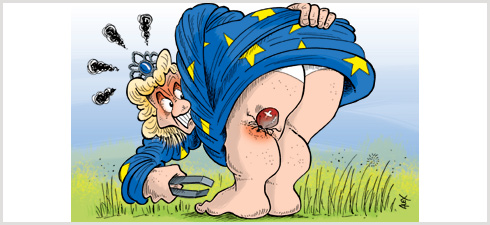With the Swiss federal council due to report on future relations with the European Union, the thorny question of the long-postponed marriage between Berne and Brussels is once again a major political issue in Switzerland. On 18 August, the national executive will present its position. At the same time, it has asked a group of experts to analyse “all the possible options” and their compliance “with the proper functioning of existing institutions” of the Swiss state. Their conclusions will be made available in a report to be published before the end of the year. It remains to be seen if the experts will advocate the continuation of the existing bilateral framework or the launch of an accession process.
But whatever happens, the status quo is not an option for Brussels. During his meeting with the Swiss Confederation president Doris Leuthard on 19 July, José Manuel Barroso pointed out that “the network of bilateral accords between Switzerland and the EU has become complex, and very difficult to manage,” and suggested that “a clearer system of rules will be required to give a fresh boost to our partnership”.
Threat to sovereignty
Berne has been engaged in bilateral agreements with the countries of the European Union since1998, and has signed more than 120 tailor-made accords, which are increasingly difficult to administrate. Negotiations have come to a halt in several sectors including electricity, health and agriculture. Brussels is insisting on the automatic adoption of EU legislation, which has been rejected by Swiss politicians who are concerned that it would compromise Swiss sovereignty. “In view of these conditions, there will certainly be major bargaining in ‘bilaterals III,’” predicts Swissinfo. In these discussions, Europe will have a key advantage, the “guillotine clause” that links the bilateral agreements. If one of the accords is no longer viable, they will all be cancelled. But without them, 50% of Swiss GDP which is generated by exports to the EU will be in jeopardy.
In July Avenir Suisse suggested an alternative, inclusion in the European Economic Area (EEA), or a “light version of accession” that would preserve the Swiss franc, and the idea has attracted some support. “For 18 years the bilateral framework has been presented to people as the best possible arrangement,” explains Michael Fust, the general secretary of the New European Movement of Switzerland (NOMES). “But between 30% and 50% of our legislation is already copied from Europe. Full membership of the EU would enable us to defend our interests!”
No to EU and NATO
René Schwok, a political scientist at the European Institute of the University of Geneva, believes that the need to remodel the bilateral framework is not as urgent as has been claimed. In the columns of the Francophone daily 24 heures, he argues that “the method of cooperation is increasingly difficult, but it will remain viable for some years”. Like many specialists, he remains guarded on the issue of the European Union, which is a taboo subject in Switzerland. In 1992, a referendum rejected European Economic Area membership; in 2001, another referendum rejected the “Yes to Europe” initiative by 76.8%. With the crisis that has been brewing since the announcement of the Greek deficit, popular opposition to the EU is greater than ever.
While in Brussels, Doris Leuthard ironically remarked that “Switzerland has a debt level of 39% of GDP, which is in line with the Maastricht criteria… if they still exist.” The political party that stands to gain most from the current debate is the right-wing, populist, conservative Swiss People’s Party (SVP), which has consistently campaigned against Europe. Its vice president Christoph Blocher recently told Matin dimanche that he was considering launching a campaign to make sure Switzerland never joined EU or NATO. And this idea has become a talking point, especially in the context of the run-up to 2011 federal elections, which are scheduled to be held in little over a year's time.
Seen from Switzerland
The great taboo subject
Eventual membership of the EU, the central question facing current Swiss foreign policy, is "an emotional minefield", because it is almost "forbidden to think like a European, under penalty of being taken for a traitor", complains Nicola Forster in the Neue Zürcher Zeitung. The president of the think tank foraus lists the 7 key questions that most directly touch on the issue of Berne's possible membership of the EU: 1. Will Switzerland be able to keep its own currency? 2. How will the current VAT increase to 15% be taken into account? 3. Will membership be more costly than the existing bilateral agreements? 4. What form will Swiss sovereignty take? 5. Will it still be possible to maintain national neutrality? 6. On direct democracy: will local referendums still be possible? 7. What will be the advantages and disadvantages of opening the markets?
Was this article useful? If so we are delighted!
It is freely available because we believe that the right to free and independent information is essential for democracy. But this right is not guaranteed forever, and independence comes at a cost. We need your support in order to continue publishing independent, multilingual news for all Europeans.
Discover our subscription offers and their exclusive benefits and become a member of our community now!












